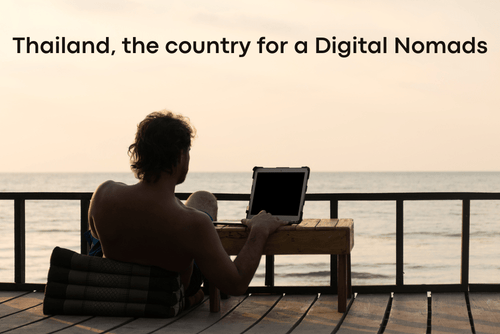Thailand, a land of captivating landscapes, vibrant culture, and warm hospitality, has emerged as a haven for digital nomads seeking to merge their professional aspirations with a life of exploration and adventure. Whether you're a seasoned remote worker or embarking on your digital nomad journey, Thailand offers an idyllic setting to blend work with wanderlust. From its bustling cities to its tranquil islands, Thailand provides diverse destinations to suit every digital nomad's preference.
Thailand is like the ultimate all-inclusive resort for digital nomads but with the added perks of being a real country with actual people (and not just animatronic robots serving you piña coladas).

Imagine working from a cozy beachside cafe, the gentle waves lapping at the shore providing the perfect soundtrack to your coding marathon. Or picture yourself tapping away at your laptop in a lush jungle setting, the sounds of exotic birds and monkeys your only office distractions. When the workday is done, Thailand offers endless fun and quirky experiences to entertain you. From indulging in the country's world-renowned cuisine to exploring ancient ruins and vibrant cities, Thailand has something for every digital nomad's taste.
So, if you're looking for a place to work remotely and have a blast, Thailand is the obvious choice. Just pack your sunscreen, swimsuit, and sense of adventure, and you're all set for an unforgettable digital nomad experience.
Prime Locations for Digital Nomads: Choosing Your Digital Nomad Haven

Thailand's diverse landscape offers a multitude of destinations to suit every digital nomad's preference. From bustling cities to tranquil islands, here are some of the most popular choices:
1. Bangkok: The vibrant capital city pulsates with a captivating blend of culture, cuisine, and entertainment, complemented by a growing number of coworking spaces and digital nomad communities. Bangkok is ideal for those seeking the full spectrum of Thai life, from bustling street markets to serene temples.
2. Chiang Mai: Renowned as the "digital nomad capital of Thailand," Chiang Mai exudes a laid-back charm, affordable living costs, and a thriving community of remote workers. Nestled amidst verdant mountains, the city offers many activities, including hiking, biking, and temple exploration.
3. Koh Lanta: This tranquil island provides a haven of serenity, with stunning beaches, a close-knit expat community, and a slower pace of life. Koh Lanta is perfect for those seeking a relaxed retreat while maintaining access to reliable internet and coworking spaces.
4. Phuket: Thailand's largest island boasts a diverse mix of beaches, mountains, rainforests, and a burgeoning digital nomad presence. Phuket caters to those who wish to balance work with outdoor adventures and immerse themselves in Thailand's natural beauty.
Guidelines for Working Remotely in Thailand: Navigation through the Visa Maze

To legally work remotely in Thailand, you'll need to obtain the appropriate visa. While there are a few options available, the two primary choices for digital nomads are:
1. Tourist Visa: This visa, valid for up to 60 days with the possibility of a 30-day extension, allows you to stay in Thailand for an extended period. However, it doesn't officially permit you to engage in work activities. The application process for a tourist visa is relatively straightforward. It can be completed online or at a Thai embassy or consulate.
2. Non-Immigrant Visa B: Specifically designed for remote workers, this visa grants you the right to work remotely in Thailand. It requires proof of employment, a monthly income of at least 20,000 THB (approximately $600), and a detailed work plan outlining your remote work activities. The application process for a Non-Immigrant Visa B is more complex. It involves submitting additional documentation, such as a letter from your employer, bank statements, and company registration documents.
3. Smart Visa: The Thai government's special digital nomad visa is the Smart Visa. It allows individuals to stay in the country for up to a year, with the option to extend for an additional year. The visa is specifically designed for entrepreneurs, investors, and highly skilled professionals interested in working and living in Thailand.
The Smart Visa costs 5,000 Thai baht (approximately $165) for a single-entry visa and 20,000 Thai baht (approximately $660) for a multiple-entry visa. In addition to the application fee, there is a processing fee of 2,000 Thai baht (approximately $66) for a single-entry visa and 4,000 Thai baht (approximately $132) for a multiple-entry visa.
With the Smart Visa, digital nomads can enjoy the benefits of living and working in Thailand without the hassle of constantly renewing their visas. It's a great option for those who want to stay in Thailand long-term and focus on building their business or advancing their career.
Recreational Pursuits for Digital Nomads

To ensure a smooth and enjoyable digital nomad experience in Thailand, embrace these essential tips:
1. Pack Light and Smart: Thailand's warm climate and relaxed lifestyle don't demand extensive packing. Prioritize versatile clothing and essential gear for your work and leisure activities. Consider bringing lightweight, breathable fabrics, comfortable shoes, and a reusable water bottle.
2. Embrace Local Culture: Immerse yourself in the rich tapestry of Thai culture by learning basic phrases, savouring local cuisine, and participating in traditional events. Dedicate time to learning a few Thai words and phrases, such as "hello" (sa-wa-dee), "thank you" (khob-khun), and "excuse me" (koh-tod-na-krub/ ka). Embark on culinary adventures by trying traditional Thai dishes like pad thai, green curry, and mango sticky rice. Participate in local festivals and events, such as Songkran (the water festival) or Loy Krathong (the festival of lights).
3. Respect Local Etiquette: Be mindful of local customs and traditions to avoid causing offense. Dress modestly when visiting temples or religious sites, and always be polite and courteous. Thai people are generally friendly and welcoming, so don't hesitate to ask for help or directions.
4. Negotiate Prices: Bargaining is an integral part of Thai culture, so don't be afraid to negotiate prices for goods and services, especially when shopping at markets or street vendors. Start by offering a lower price than the asking price, and be prepared to walk away if you're not satisfied with the final offer.
References:
- Getting your Thailand digital nomad visa
- Thailand Digital Nomad Visa and Alternative
- Thailand a top Digital Nomad destination










